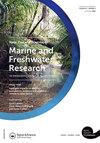Taura kuku:优先考虑Māori的知识和资源,为Ōhiwa港口的贝类恢复创造可生物降解的贻贝贝沉降线
IF 1.7
4区 环境科学与生态学
Q3 FISHERIES
New Zealand Journal of Marine and Freshwater Research
Pub Date : 2022-07-03
DOI:10.1080/00288330.2022.2111447
引用次数: 5
摘要
摘要Mātauranga Māori(毛利人知识)是以基于地方的多代知识为基础的,以及这些知识与产生这些知识的环境之间的联系。自然世界的所有元素都是相关的,这是理所当然的,而生存依赖于这些关系。毛利人的世界观主张每一代人都有责任将至少与他们自己继承的一样多的资源传给他们的后代。对毛利人来说,环境的健康是对人民健康的直接反映。本文概述了毛利人领导的希瓦港海洋修复项目。该跨学科项目与一位传统的毛利编织大师和kaumātua(部落长老)合作,开发了由传统的毛利植物生物废料和其他天然材料制成的可生物降解的taura kuku(绿唇贻贝吐口定居线,以下简称taula kuku)。事实证明,taura kuku是招募和安置野生贻贝的成功工具,有助于在具有文化和生态重要性的希瓦港(传统食物篮)恢复贝类并增加海洋生物多样性。本文章由计算机程序翻译,如有差异,请以英文原文为准。
Taura kuku: prioritising Māori knowledge and resources to create biodegradable mussel spat settlement lines for shellfish restoration in Ōhiwa harbour
ABSTRACT Mātauranga Māori (Māori knowledge) is grounded in place-based, multi-generational knowledge and the connection of that knowledge with the environments from which it is derived. It takes for granted that all elements of the natural world are related, and it is upon those relationships that survival depends. A Māori worldview advocates for the responsibility of each generation to pass onto their descendants at least as good a supply of resources as they, themselves, had inherited. For Māori, the wellness of the environment is a direct reflection on the wellness of the people. This article provides an overview of a practical mātauranga Māori-led marine restoration project in Ōhiwa harbour. The transdisciplinary project worked with a traditional Māori master weaver and kaumātua (tribal elders) to develop biodegradable taura kuku (green-lipped mussel spat settlement lines, hereafter taura kuku) made from traditional Māori plant biowaste and other natural materials. The taura kuku proved a successful tool for the recruitment and settlement of wild mussel spat assisting shellfish restoration and increasing marine biodiversity in the culturally and ecologically important mahinga kai (traditional food basket) of Ōhiwa harbour.
求助全文
通过发布文献求助,成功后即可免费获取论文全文。
去求助
来源期刊
CiteScore
4.50
自引率
12.50%
发文量
35
审稿时长
3 months
期刊介绍:
Aims: The diversity of aquatic environments in the southern continents and oceans is of worldwide interest to researchers and resource managers in research institutions, museums, and other centres. The New Zealand Journal of Marine and Freshwater Research plays an important role in disseminating information on observational, experimental, theoretical and numerical research on the marine, estuarine and freshwater environments of the region.

 求助内容:
求助内容: 应助结果提醒方式:
应助结果提醒方式:


